Films with theme "La précarité", sorted by revenue
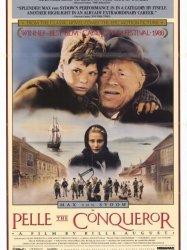
Pelle the Conqueror (1987)
, 2h37Directed by Bille August
Origin Danemark
Genres Drama
Themes Films about alcoholism, Films about children, Films about immigration, La précarité
Actors Max von Sydow, Erik Paaske, Björn Granath, Astrid Villaume, Axel Strøbye, Sofie Gråbøl
Based upon the famous 1910 novel of the same name by Danish writer Martin Andersen Nexø, the film is set in the late 1850s and early 1860s. A boat filled with emigrants from Sweden arrives at the Danish island of Bornholm. Among them are Lasse Karlsson and his son Pelle who have moved to Denmark from Skåne County, in southern Sweden, to find work after the death of Pelle's mother. They find employment at a large farm, but find themselves treated as the lowest form of life. It is only as Pelle starts to speak Danish that he begins to gain in confidence, but is still discriminated against as a foreigner. But neither boy nor father is willing to give up their dream of finding a better life than that which they left in Sweden.

Discount (2015)
, 1h35Directed by Louis-Julien Petit
Origin France
Genres Comedy, Comedy-drama
Themes Films about the labor movement, La précarité
Actors Olivier Barthélémy, Corinne Masiero, Pascal Demolon, Zabou Breitman, Sarah Suco, Yves Verhoeven
Subissant des conditions de travail difficiles et menacés de licenciement à cause de l'arrivée prochaine de caisses en libre-service, les employés d'un supermarché de type hard-discount décident de monter un magasin parallèle en se fournissant dans les stocks de leur employeur avec, entre autres, des marchandises devant être gaspillées du fait de la date limite de consommation et du modèle d'entreprise de la grande distribution.
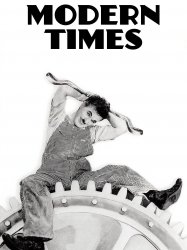
Modern Times (1936)
, 1h27Directed by Charlie Chaplin
Origin USA
Genres Drama, Comedy, Comedy-drama, Romantic comedy, Romance
Themes Sports films, Films about the labor movement, La précarité
Actors Paulette Goddard, Charlie Chaplin, Henry Bergman, Tiny Sandford, Chester Conklin, Hank Mann
Modern Times portrays Chaplin as a factory worker employed on an assembly line. There, he is subjected to such indignities as being force-fed by a "modern" feeding machine and an accelerating assembly line where he screws nuts at an ever-increasing rate onto pieces of machinery. He finally suffers a nervous breakdown and runs amok, throwing the factory into chaos. He is sent to a hospital. Following his recovery, the now unemployed factory worker is mistakenly arrested as an instigator in a Communist demonstration. In jail, he accidentally ingests smuggled cocaine, mistaking it for salt. In his subsequent delirium, he gets out of the jail. When he returns, he stumbles upon a jailbreak and knocks the convicts unconscious. He is hailed a hero and is released.

A Better Life (2011)
, 1h38Directed by Chris Weitz
Origin USA
Genres Drama
Themes Films about immigration, La précarité
Actors Demián Bichir, Joaquín Cosío, Nancy Lenehan, Dolores Heredia, Gabriel Chavarria, Rolando Molina
Carlos Galindo (Demián Bichir) works as a gardener with Blasco Martinez (Joaquín Cosio) in Los Angeles, California. Blasco wants to return to Mexico and continually tries to persuade Carlos to purchase his business from him, which includes the work truck and gardening tools. Carlos's son Luis (José Julián) is in high school and is dating Ruthie Valdez (Chelsea Rendon), the niece of a local gang leader. Luis regularly goes to her house after school where gang members congregate. Luis is embarrassed by his father and, although he does not wish to follow in his footsteps, has a hard time committing himself to his education. However, his relationship with Ruthie and his friendship with Facundo (Bobby Soto) pushes him toward becoming a gang member.
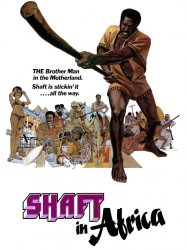
Shaft in Africa (1973)
, 1h52Directed by John Guillermin
Origin USA
Genres Thriller, Action, Adventure, Crime
Themes Films set in Africa, Films about immigration, Films about terrorism, La précarité
Actors Richard Roundtree, Frank Finlay, Neda Arnerić, Vonetta McGee, Frank McRae, Spiros Focás
At home in his New York City apartment, John Shaft is drugged with a tranquilizer dart, then kidnapped and persuaded by threats of physical force, the promise of money, and the lure of a pretty tutor to travel to Africa (much of the movie was filmed in Ethiopia), assuming the identity of a native-speaking itinerant worker. His job is to help break a criminal ring that is smuggling immigrants into Europe then exploiting them. But the villains have heard that he is on his way.

Crossing Over (2009)
, 1h53Directed by Wayne Kramer
Origin USA
Genres Drama, Crime
Themes Films about immigration, La précarité
Actors Harrison Ford, Ray Liotta, Ashley Judd, Tammin Sursok, Jim Sturgess, Lizzy Caplan
(Note: There are several stories interwoven throughout the movie. For simplicity, they are separated out in this description, each with its own paragraph.)

Our Children (2012)
, 1h51Directed by Joachim Lafosse
Origin France
Genres Drama, Romance
Themes Films set in Africa, Films about alcoholism, Films about families, Films about immigration, Psychologie, La précarité
Actors Niels Arestrup, Tahar Rahim, Émilie Dequenne, Stéphane Bissot, Nathalie Boutefeu, Baya Belal
Murielle et Mounir, un couple heureux, va se marier et avoir des enfants sous le toit du bienveillant Docteur Pinget. Petit à petit, les relations deviennent complexes, étouffent le couple et la famille, qui ne se doutent pas de la fin tragique vers laquelle ils tendent.

As Luck Would Have It (2011)
, 1h35Directed by Álex de la Iglesia
Origin Espagne
Genres Drama, Comedy
Themes Films about the labor movement, La précarité
Actors Salma Hayek, José Mota, Juan Luis Galiardo, Blanca Portillo, Carolina Bang, Javier Botet
Roberto Gómez, a former advertising executive, has been unemployed for several years. Though he is happily married, he is depressed and feels as if he has failed his family. His wife, Luisa, attempts to cheer him up as he leaves for an interview with a former business partner and friend, Javier Gándara. When Roberto arrives, his former co-workers are distant and cold. Gándara tells him that there are no positions available, and Roberto leaves dejected. Remembering that his wife wants to vacation at the hotel where they spent their honeymoon, he impulsively drives off to visit it, only to find that it is now the site of a museum and important archeological dig. As Roberto wanders about the site during an important press event, he panics when he sees security guard Claudio and falls a great distance.

Hobo with a Shotgun (2011)
, 1h26Origin Canada
Genres Science fiction, Thriller, Comedy, Action, Adventure, Horror, Crime, Politic
Themes Films about alcoholism, La précarité, Comedy horror films
Actors Rutger Hauer, Molly Dunsworth, Brian Downey, Gregory Smith, Robb Wells, Nick Bateman
A hobo (Rutger Hauer) arrives by boxcar in Hope Town, its welcome sign repainted to read "Scum Town". Scum Town is ruled by a man known as "The Drake" (Brian Downey) and his sadistic, murderous sons Ivan (Nick Bateman) and Slick (Gregory Smith). Just as he arrives, the Hobo witnesses an amateur film maker (Pasha Ebrahimi) shooting a "Bumfight" movie. While pushing his shopping cart of recyclables through the streets, he sees a distressed, bloodied man wearing a manhole cover stockade screaming for assistance. Two cars approach the man revealing Ivan, Slick and The Drake. An argument ensues and it is revealed the man in the stockade is The Drake's younger and disliked brother, Logan (Robb Wells). The Drake explains to the townspeople that his brother will serve as an example of his control and carries out the public decapitation of Logan with a barbed-wire noose attached to The Drake's truck.

The Big One (1998)
, 1h31Directed by Michael Moore
Origin USA
Genres Documentary
Themes La mondialisation, Films about the labor movement, La précarité, Documentary films about business, Documentaire sur l'altermondialisme, Documentary films about politics, Documentaire sur le monde du travail, Political films
Actors Michael Moore, Garrison Keillor
The Big One est un documentaire américain de Michael Moore réalisé en 1997 lors de la tournée de promotion de son livre Downsize This! à travers les États-Unis. À chaque ville traversée le film montre la réalité sociale et le chômage en allant à la rencontre des salariés et des dirigeants d'entreprise. Il dénonce les pratiques de multinationales qui licencient leur personnel alors qu'elles font des bénéfices, ou comme Nike, dont certains sous-traitants utilisent le travail des enfants.
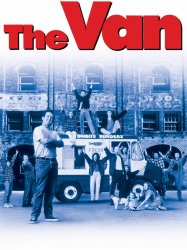
The Van (1996)
, 1h40Directed by Stephen Frears
Origin United-kingdom
Genres Drama, Comedy
Themes Cooking films, Sports films, Transport films, Films about the labor movement, La précarité, Films about automobiles, Association football films
Actors Colm Meaney, Rúaidhrí Conroy, Brendan O'Carroll, Eileen Walsh, Marie Mullen, Jon Kenny
Set in "Barrytown", a fictitious working-class quarter of Dublin. Brendan "Bimbo" Reeves gets laid off from his job as a baker. With his redundancy cheque, he buys a van and sells fish and chips with his best mate, Larry. Due, in part, to Ireland's surprising success at the 1990 FIFA World Cup, their business starts off well. But the relationship between the two friends soon becomes strained as Bimbo and his wife, Maggie behave more and more like typical bosses. Larry believes that Maggie is the cause of the strained friendship, as he thinks she is pushing Bimbo away from him. The van is closed down because of poor hygiene by health inspector, Des O'Callaghan. Bimbo thinks that Larry told the Health Board about the van, leading to a fight between the two. Larry quits the job, despite Bimbo's best efforts to get him back. Bimbo then drives the van into the sea, so as to win his friendship with Larry back.
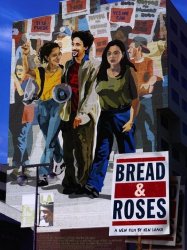
Bread and Roses (2000)
, 1h50Directed by Ken Loach
Genres Drama, Comedy
Themes Films about alcoholism, Films about immigration, Films about the labor movement, La précarité, Political films
Actors Adrien Brody, Elpidia Carrillo, Pilar Padilla, Jack McGee, Lillian Hurst, George Lopez
Le cœur gros, Maya a laissé sa mère a Cuernavaca pour émigrer aux États-Unis. Après bien des péripéties, elle arrive à Los Angeles où vit depuis longtemps sa sœur ainée Rosa. Énergique et décidée, Maya décroche un premier job de serveuse dans un bar de nuit puis obtient de Rosa, employée dans une entreprise de nettoyage, qu'elle la présente à son directeur, Perez. Devenue femme de ménage, Maya se retrouve au milieu d'une armée d'employées de toutes les nationalités, qui travaillent dans des conditions inacceptables. Maya refuse de se soumettre.

Blood of My Blood (2007)
, 1h50Origin Argentine
Genres Drama, Thriller
Themes Transport films, La précarité, Road movies, L'émigration
Actors Jesús Ochoa, Eugenio Derbez
Padre Nuestro tells the story of Diego, a young Mexican boy who smuggles himself to Brooklyn to meet his long-lost father, but whose identity is stolen by an impostor.

Bicycle Thieves (1948)
, 1h33Directed by Vittorio De Sica
Origin Italie
Genres Drama
Themes Films about families, Films about religion, Films about the labor movement, La précarité
Actors Lamberto Maggiorani, Enzo Staiola, Lianella Carell, Elena Altieri, Sergio Leone, Memmo Carotenuto
In post-World War II Val Melaina neighbourhood of Rome, Antonio Ricci (Lamberto Maggiorani) is desperate for work to support his wife Maria (Lianella Carell), his son Bruno (Enzo Staiola), and his small baby. He is offered a position posting advertising bills, but tells Maria that he cannot accept because the job requires a bicycle. Maria resolutely strips the bed of her dowry bedsheets—prized possessions for a poor family—and takes them to the pawn shop, where they bring enough to redeem Antonio's pawned Fides brand bicycle.

My Son the Fanatic (1997)
, 1h27Genres Drama, Comedy
Themes Films about immigration, La précarité
Actors Om Puri, Rachel Griffiths, Akbar Kurtha, Stellan Skarsgård, Sarah-Jane Potts, Harish Patel
The plot of the film revolves around Parvez (Om Puri), a Pakistani-born taxi driver and a tolerant, secular Muslim. His life takes an unexpected dark turn when his son Farid converts to fundamentalist Islam, leading to a family breakdown and social conflict.
 Connection
Connection